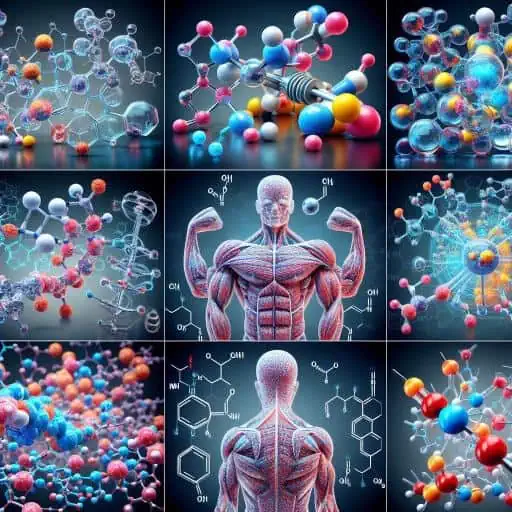Best Peptides For Muscle Growth: Guide For Bodybuilding!
From protein shakes to pre-workouts, I’ve tried it all to increase muscle mass. Now, the buzz is about whether peptides can help stimulate muscle growth. But are they worth the hype? Let’s see how much this statement holds true!
In the race for a toned physique and peak performance, bodybuilders constantly navigate a landscape of emerging tools and techniques.
Peptides are short chains of amino acids and have recently entered the spotlight, touted as a potential shortcut to building muscle mass.
But before you jump on the bandwagon, it’s crucial to separate fact from fiction and understand the true potential, risks, and complexities surrounding peptides in bodybuilding.
This guide dives deep into the world of peptides, exploring their effects on muscle growth, analyzing their efficacy and safety concerns, and ultimately empowering you to make informed decisions about incorporating them into your bodybuilding journey.
In addition, I’ll be telling you about the best peptides to try for muscle growth & bodybuilding.
I. Peptides For Muscle Growth: Do Peptides Work for Muscle Growth & Bodybuilding?

The promise of faster gains and shredded abs through peptides for muscle growth has exploded in the bodybuilding world.
But before we explore the best peptides for muscle growth, let’s dissect the science and separate fact from fiction.
A. Peptides For Bodybuilding: Looking At Its Mechanism
Peptides function through various pathways potentially influencing muscle growth. Some, like Growth Hormone Secretagogues (GHRPs), stimulate the pituitary gland to release more Growth Hormone (GH), a key player in muscle repair and protein synthesis.
Others, like Insulin-like Growth Factor-1 (IGF-1) peptides, directly affect muscle cells, encouraging growth.
B. Peptide Use: Beyond Scientific Efficacy
Safety concerns cloud the peptide landscape.
Potential side effects, like Carpal Tunnel Syndrome and even tumor growth, are reported.
This, coupled with limited long-term research, raises ethical concerns about using peptides for purely aesthetic purposes.
C. Using Peptides For Muscle Growth: The Debate Continues
Bodybuilding forums and communities are rife with conflicting opinions.
Some users swear by specific peptides, touting their transformative effects.
Others express skepticism, citing the lack of conclusive evidence and potential health risks.
D. Is there any Best Peptide For Muscle Growth? Navigating the Maze
So, do peptides actually promote muscle growth?
The answer, unfortunately, isn’t straightforward.
While certain peptides show promise in research, the lack of conclusive evidence and potential safety concerns demand caution.
Before considering them, you need to take note of the following:
- Limited Research: Data on efficacy and safety, especially in healthy individuals, is scarce.
- Individual Variability: Responses can differ based on factors like body composition and peptide source.
- Ethical Concerns: The use of peptides for purely aesthetic purposes raises ethical questions.
Ultimately, the decision to use peptides rests with you.
However, remember to prioritize your health and approach this option with informed skepticism and a critical eye.
Consult a healthcare professional before making any decisions, and weigh the potential benefits against the documented risks carefully.
It’s also important to note that building muscle requires dedication to training, nutrition, and rest.
While exploring new tools like peptides may seem tempting, prioritize responsible choices that safeguard your well-being and long-term fitness goals.
SUMMARY: Peptides for muscle growth are popular in bodybuilding, but their effectiveness and safety are debated. While they may influence muscle growth pathways, safety concerns, limited research, and conflicting opinions exist.
Consulting a healthcare professional is essential before considering peptide use. Achieving muscle growth requires dedication to training, nutrition, and rest, with responsible choices being crucial for safeguarding well-being and fitness goals.
II. Best Peptides for Muscle Growth – Proceed with Caution!

The idea and application of peptides for muscle growth is vast and complex, with various categories boasting potential benefits and drawbacks.
Remember, safety and responsible use are paramount, so consider this section as an informative overview, not a recommendation to use any specific peptide.
1. Growth Hormone Secretagogues:
- Purported Benefits: Stimulate the pituitary gland to release more growth hormone, potentially leading to increased muscle mass and protein synthesis. Some popular GHRPs include GHRP-6 and CJC-1295.
- Potential drawbacks: Can cause side effects like headaches, water retention, and tingling sensations. Long-term effects and safety profiles are still under investigation.
- Research and popularity: Studies on GHRPs for muscle growth show mixed results. Research mentions GHRP as a popular choice but emphasizes consulting a doctor due to potential risks.
2. Human Growth Hormone-Releasing Peptides (GHRPs):
- Purported Benefits: Similar to GHRPs, stimulate growth hormone release, potentially promoting muscle growth and fat burning. Examples include Hexarelin and Ipamorelin.
- Potential Drawbacks: Side effects may include drowsiness, hunger changes, and carpal tunnel syndrome. Research on long-term safety is limited.
- Research and Popularity: Studies haven’t yet definitively proven the effectiveness of GHRPs for muscle growth. Dr. William Seeds highlights the lack of conclusive evidence and potential health risks.
3. Insulin-like Growth Factor (IGF-1) Peptides:
- Purported Benefits: Mimic the effects of IGF-1, a hormone crucial for muscle growth and recovery. They might help increase lean muscle mass and improve strength. Examples include IGF-1 LR3 and Des Glycine IGF-1.
- Potential Drawbacks: Can cause severe side effects like hypoglycemia, organ damage, and even tumor growth. They are highly regulated and often illegal to obtain without a prescription.
- Research and Popularity: The use of IGF-1 peptides for bodybuilding is unethical and potentially dangerous. In humans, the effects of attempts to augment muscle mass using IGF-I have been less dramatic.
4. Collagen Peptides:
- Purported Benefits: Support joint health and potentially improve muscle recovery by providing amino acids for collagen synthesis. They are generally considered safe and well-tolerated.
- Potential Drawbacks: While they might enhance recovery, evidence for direct muscle growth is limited.
- Research and Popularity: Collagen peptides are generally viewed as safe and offer potential benefits for joint health and recovery. Research indicates that they primarily support connective tissue, not directly building muscle mass. However, combined with functional strength training or resistance training, the use of collagen peptides is proven to be effective in building muscle mass in the elderly.
While there’s very limited research as to which peptides are the best for building muscle, the options we have covered above are backed by research and may considered to be the best for muscle growth (at this stage).
It’s always advisable to pursue products backed by extensive research and FDA approval.
Use peptides with caution and don’t forget to take a consultation with a healthcare professional.
I believe that proper training, nutrition, and rest remain the safest and most sustainable for you to stimulate muscle growth to achieve muscle hypertrophy, increase muscle growth, and enhance muscle definition.
Disclaimer: This information is for educational purposes only and does not constitute medical advice. Please consult with a qualified healthcare professional before making any decisions regarding your health and fitness.
SUMMARY: Peptides offer potential benefits for muscle growth, but caution is advised due to safety concerns and limited research. Growth Hormone Secretagogues like GHRP-6 and CJC-1295 stimulate growth hormone release but may cause side effects.
Human Growth Hormone-Releasing Peptides (GHRPs) like Hexarelin and Ipamorelin have similar effects but lack conclusive evidence of effectiveness. Insulin-like Growth Factor (IGF-1) Peptides mimic IGF-1 but carry severe side effect risks and are often illegal.
Collagen Peptides support joint health and recovery but have limited evidence for direct muscle growth. Proper training, nutrition, and rest remain the safest methods for muscle growth. Consult a healthcare professional before using peptides.
III. Peptides For Bodybuilding: Understanding Key Considerations

The concept of “quick fixes” in bodybuilding can be tempting, but when it comes to peptides, there’s a lot of caution and considerations that you need to consider.
1. Individual Needs Matter
Each person’s body is unique, with varying health conditions, training regimens, and responses to different substances. What works for one person might not be safe or effective for another.
2. Consult a Healthcare Professional:
Never consider using peptides without thorough consultation with a qualified healthcare professional. They can assess your individual health, training goals, and potential risks associated with using specific peptides.
3. Beyond Muscle Gain
It’s crucial to understand that peptides impact more than just muscle tissue.
They can affect hormone levels, metabolism, and various bodily functions. Ignoring these wider implications can have serious consequences.
4. Potential Side Effects
Be aware of the potentially severe side effects associated with peptide use, including:
- Hormone Imbalances leading to fatigue, mood swings, and sexual dysfunction.
- Organ damage to the liver, kidneys, and heart.
- Increased risk of cancer in certain cases.
5. Legal and Ethical Concerns
It’s important to acknowledge the legality surrounding peptide use.
Many peptides are not approved by regulatory bodies like the FDA for muscle growth in healthy individuals, making their acquisition and use problematic.
6. Ethical Considerations
Using unapproved peptides for purely aesthetic purposes raises ethical concerns.
Prioritizing appearance over legitimate medical needs carries significant societal and personal responsibilities.
Muscle building should be a journey focused on sustainability and well-being.
Natural methods like proper training, balanced nutrition, and adequate rest remain the cornerstone of safe and effective muscle growth than the use of peptides for bodybuilding alone.
Ultimately, the decision to use peptides rests with you.
SUMMARY: Using peptides for bodybuilding requires caution and consideration. Individual needs vary, so consultation with a healthcare professional is crucial. Peptides impact hormone levels and bodily functions, with potential side effects including hormone imbalances and organ damage.
Legal and ethical concerns exist, as many peptides are not approved for muscle growth. Prioritizing health over appearance is important. Natural methods like training, nutrition, and rest are safer and more sustainable for muscle growth. Ultimately, the decision to use peptides should be made responsibly, prioritizing well-being.
IV. Weighing the Risks and Benefits of Peptides For Muscle Growth

Before considering any peptide use, it’s critical to weigh the potential benefits against the documented risks and side effects.
Remember, the risks are real and often outweigh any unproven benefits.
Prioritizing Responsible Practices
Building muscle safely and sustainably requires dedication to proven methods:
- Proper Training: A well-designed training program is the foundation for muscle growth.
- Balanced Nutrition: Fueling your body with the right nutrients is essential for optimal muscle development.
- Adequate Rest: Recovering properly allows your muscles to repair and grow stronger.
V. Moving Forward: Enhance Muscle Growth and Build Muscle Responsibly!

The world of peptides has entered the spotlight as a potential shortcut to muscle growth.
However, after exploring the science, ethics, and potential risks, it’s crucial to approach this topic with informed skepticism and prioritize responsible practices.
A. Key Takeaways about Peptides for Muscle Growth:
- Limited Research: While specific peptides may show promise in some studies, conclusive evidence for their effectiveness and safety in healthy individuals is lacking.
- Significant Risks: The potential side effects of using peptides for muscle growth are serious and varied, ranging from hormone imbalances to organ damage, and even increased cancer risk.
- Ethical Concerns: Many peptides used for this purpose are not approved by regulatory bodies, making their acquisition and use potentially illegal and unethical.
B. Informed Decision-Making
- Consult a Healthcare Professional: Discuss any alternative methods with a doctor or qualified professional who can assess your health and potential risks.
- Be Critical of Information: Approach claims about peptides for muscle growth with skepticism and prioritize information from reliable sources.
- Prioritize Health and Ethics: Remember, your well-being and responsible practices should always come first.
C. Muscle Building is a Journey
Remember, building muscle is a journey, not a race.
No quick and unrealistic hack like using human growth hormone, growth hormone-releasing hormone, or any release of growth hormone has precedence over natural bodybuilding aimed for overall fitness and well-being.
Peptides, known these days to build muscle and stimulate the production of growth muscle mass, are fain when it comes to classic bodybuilding through rigorous training and balanced nutrition.
Prioritize your health, ethical practices, and informed decision-making.
By choosing responsible methods and dedication to a sustainable approach, you can achieve your fitness goals safely and effectively.
Author’s Opinion
As someone passionate about health, fitness, and natural bodybuilding, I can’t help but feel a pang of concern when discussions veer toward unapproved peptides for muscle growth.
While the desire for sculpted physiques is understandable, the potential risks associated with these substances simply outweigh any alluring promises of a shortcut.
My stance isn’t rooted in mere fear-mongering; it’s grounded in the absence of conclusive evidence supporting their effectiveness and the documented presence of serious health risks.
We simply don’t have enough robust data to condone using peptides for purely aesthetic purposes, especially knowing the potential consequences they might hold.
Moreover, the ethical concerns surrounding unapproved peptide use cannot be ignored.
Bypassing regulations and prioritizing appearance over legitimate medical needs creates a slippery slope and potentially harms individuals and the medical system as a whole.
I hope that this exploration has served as a wake-up call. Building muscle takes dedication, not dangerous shortcuts.
Let’s celebrate and embrace the tried-and-true methods: focused training, balanced nutrition, and adequate rest. These methods not only deliver results but also prioritize your well-being and ethical principles.
Remember: Your health and well-being are paramount. Choose wisely and prioritize safe and ethical practices for a successful and fulfilling bodybuilding journey.
Let’s build a culture of fitness grounded in safety, responsibility, and respect for our bodies and the medical community. Together, we can achieve our goals and inspire others to do the same, all while remaining healthy and ethical.
Frequently Asked Questions
Q1. Which Peptide is Best for Muscle Growth?
A: There isn’t a single “best” peptide for muscle growth as effectiveness can vary depending on individual response and goals.
Q2. Are Peptides Safer than Steroids?
A: Generally, peptides are considered safer than steroids due to their more targeted action and reduced risk of severe side effects.
Q3. Do Peptides Have Side Effects?
A: Peptides can have side effects, including water retention, joint pain, and changes in blood pressure, but they’re typically milder than those of steroids. Detailed side effects have been covered in the blog.
Q4. Are Peptides Steroids?
A: No, peptides are not steroids. They are short chains of amino acids, while steroids are synthetic drugs related to testosterone.
Q5. Is Creatine A Peptide?
A: No, creatine is not a peptide. It’s a nitrogenous organic acid that helps supply energy to cells, particularly muscle cells.
Q6. Do Peptides Lower or Increase Testosterone?
A: Peptides can have varying effects on testosterone levels, depending on the specific peptide and individual factors.
Q7. What is the Disadvantage of Peptides?
A: One disadvantage of peptides is that they may require frequent injections, which can be inconvenient for some users.
Q8. Do Peptides Affect Your Liver?
A: Some peptides may affect liver function, but the risk is generally lower compared to many oral steroids.






